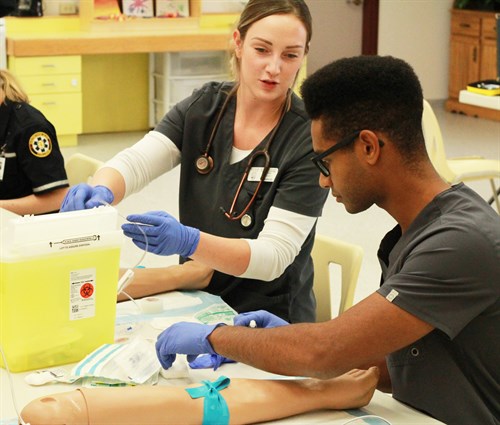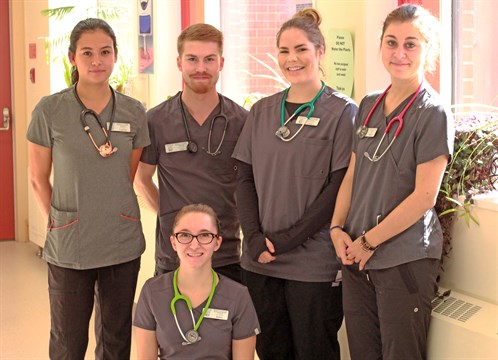More than 40 nursing and paramedic students from Medicine Hat College experienced the demands of working in a rural hospital on September 25, thanks to a unique collaboration between the College, Alberta Health Services, and RhPAP.
The skills day at Bow Island Health Centre saw the group of students experience 45-minute simulations ranging from airway management and spinal immobilization, to working in the STARS Mobile Education Unit. The event was modelled after RhPAP medical skills events for rural Alberta high school and post-secondary students, which enable participants to experience health-care delivery in a rural setting.

Medicine Hat College rural nursing instructor, JoDee Wentzel, says that opportunities like this allow the students to gain a greater understanding of what they can expect to see on their upcoming rural placements.
“Getting to see what a paramedic’s responsibilities are, how they work with the nursing staff at the hospital, is a huge piece of better understanding how a rural hospital works,” says Wentzel. “Collaboration is so important in a rural setting and today they are getting a chance to see how that works.”
Fourth-year nursing students Elizabeth Broadhead and Daniel Menesho had their first taste of rural clinical work today, and say it was valuable to see just how varied the work day can be.
“Today we really got to see what a rural hospital is like and what we can expect to see come through the door,” says Menesho.
“You have to be an expert in a little bit of everything in a rural hospital,” explained Broadhead. “Someone could come in with an imminent birth or a motor vehicle accident and you’re the one who has to treat them.”

For second-year paramedic students, Satinder Singh and Thomas Domingo the hands-on learning opportunity offered at the skills day was a fun and valuable learning experience.
“So far today we have completed the spinal immobilization simulation and the STARS bus simulation,” says Domingo. “The dummy that we perform the simulation in the STARS simulation does everything that a real person would do,” says Singh. “It breathes in and out, it has a pulse and everything like that so you can run real-life scenarios on it, which is super helpful when you’re learning.”
The students and their instructors were treated to an RhPAP sponsored lunchbreak, where they were able to catch up with their colleagues to discuss the simulations they’d completed so far. Wentzel says that for many of the students, the skills day was the first time they’d stepped into a rural hospital but based on the feedback and experience, it won’t be their last.
